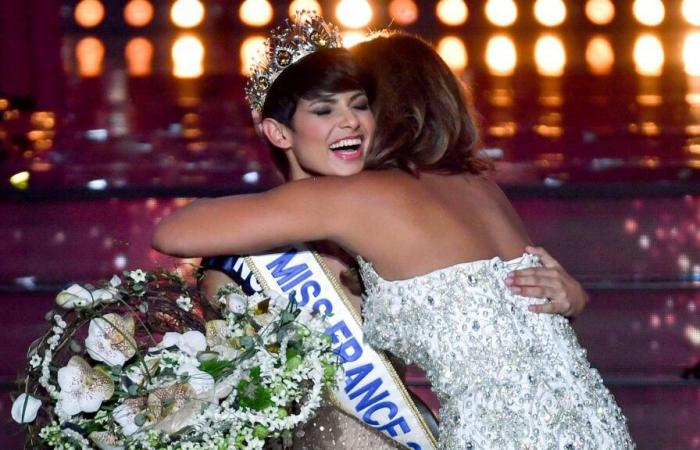ARNAUD FINISTRE / AFP via Getty Images
For Ève Gilles, Miss France 2024, there “is nothing more feminist” than this competition.
SEXISM – There are certain things that we can always count on during a Miss France evening: the slightly embarrassing jokes of Jean-Pierre Foucault, the colorful regional costumes, lots of Saint Algue gifts, and, for some time now, years, at least one question on feminism.
Seven years after the explosion of the #MeToo movement and the questioning of the sexism of many industries, the beauty pageant seems increasingly out of step with the times. For several editions, the organizers of Miss France have therefore tried to get up to date, increasing the number of announcements, rule changes, and messages on the supposed feminism of the program.
To the point of proclaiming, as did Ève Gilles, current holder of the crown, in an interview with Brut in September, that he “There’s nothing more feminist” as Miss France. Efforts that struggle to convince in the face of a competition pitting women against each other on (largely) physical criteria.
Reading this content may result in cookies being placed by the third-party operator who hosts it. Taking into account the choices you have expressed regarding the deposit of cookies, we have blocked the display of this content. If you wish to access it, you must accept the “Third Party Content” category of cookies by clicking on the button below.
Play Video
“Reductive beauty standards”
The changes in criteria in the selection of Misses are among the most publicized measures taken by the competition to be a little more in tune with the times. Since June 2022, the competition has been open to tattooed women, married, divorced, mothers, whatever their age – the oldest in the competition for Miss France 2025 has the canonical age of 34, a first in the history of the show. Among the criteria still in place, we find height – you must be at least 1m70 for “practical” reasons linked to trying on dresses – as well as the fact of having never participated in naked photo shoots.
Elsa Labouret is spokesperson for Dare to Feminism!, the association which continued the production of Miss France before the Industrial Tribunal for “discriminatory and illegal recruitment process” (a procedure which was dismissed in 2023 by the courts). For her, These changes in criteria, which followed the action of the association, are very cosmetic. “Basically, we stick with a young, tall, rather thin woman, even if weight is not an entry criterion it remains constant, she explains in detail HuffPost. We can clearly see that the women who are in the competition are all on the same model. »
Because whatever the criteria, Miss France is a competition which pits women against each other. And who does it, what's more, according to “very heterocentric and heteronormative norms”as pointed out Hélène Breda, lecturer at the Sorbonne and specialist in gender in pop culture. “There is this idea of women treated as beautiful objects, who are exhibited, who are evaluated through a very normative and very narrow reading grid, with reductive standards of beauty”summarizes the researcher.
A male gaze despite a jury of women
“This raises the question of the validity of judging people based on their physical appearance, continues Hélène Breda. Especially since it has a lot more impact when we do it for women. Because competitions for men exist, but it is incomparable in terms of visibility and media coverage. We remain permanently entangled in logics of evaluation of women who find it difficult to evolve. »
Faced with critics who accuse it of sexualizing women's bodies for the male gaze, the competition found a solution: this year, like last year, the celebrity jury is 100% female. A situation which was not necessarily intended if we are to believe the president of the Miss France company who explained to Parisian to have “launched quite a few tracks for men and women”without success on the male side. Maybe “has it become complicated for a man to be a Miss France juror since the #MeToo wave”he asks himself.
However, this jury made up of women gives an argument to the defenders of the program, who emphasize that the Misses will not be judged by a male gaze. An argument that struggles to convince Elsa Labouret: “Women can absolutely implement sexist dynamics, she recalls. We can be sexist towards each other. Having a jury of women is a guarantee, but we do not address the fundamental problems. » An observation shared by Hélène Bréda who recalls that “the way we look at these bodies has been shaped, for generations and even when we are a woman, by male desire.” Enough to explain, undoubtedly, the model of very uniform beauty presented in the competition.
A tool of emancipation?
Well aware of all these contradictions, the competition now includes a question on feminism in the moments of discussion with the five finalists. A sequence which often gives rise to fairly naive exchanges on the emancipation of women. As when a candidate for Miss France 2024 was asked what Simone de Beauvoir's sentence meant to her, “We are not born a woman, we become one”. His response? A woman must take “each of his experiences to be able to train as well as possible and have a dream life the next day”.
A moment of dissonance which above all underlines the opportunism of a competition which attempts to surf on feminist references which are nevertheless incompatible with its DNA. “It’s pure washing feminismestimates Elsa Labouret. If we wanted to make a parody, we couldn't do better. »
As for the Misses themselves, however, the same refrain often comes up. The competition gave them an unexpected platform. It is “an incredible springboard in a woman’s life”summarizes Ève Gilles in her interview with Brut. Same story with Diane Leyre, Miss France 2022, who declared the day after her election: “ I have never felt more feminist than on stage tonight, taking power over my life. Because that’s what feminism is for me. »
It's difficult to deny the impact of the Miss France election on the lives of the young elected officials. But a great story for one woman is not necessarily synonymous with progress for all women: “Feminism is not an individual sensation, it is a social and political movement which wants the liberation of all women, recalls Elsa Labouret. It's not enough to feel good and empower yourself. Let's take a step back from the societal impact: does this competition contribute to the liberation of all women? For us, the answer is “no”. »
Also read on The HuffPost:
Reading this content may result in cookies being placed by the third-party operator who hosts it. Taking into account the choices you have expressed regarding the deposit of cookies, we have blocked the display of this content. If you wish to access it, you must accept the “Third Party Content” category of cookies by clicking on the button below.
Play Video






